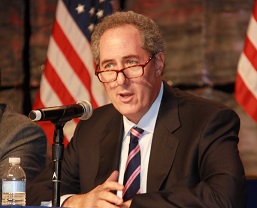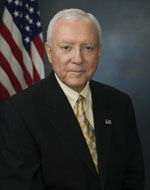 |
| U.S. Trade Representative Michael Froman |
SINGAPORE--Don't look for any Trans-Pacific Partnership agreement on patent lengths for biologics this year. That was the message delivered at a congressional hearing on Tuesday. Though U.S. Trade Representative Michael Froman backed approval for the trade deal, he conceded that there was "no consensus on how long to protect the exclusivity of biologic drugs."
That fact didn't please Sen. Orrin Hatch (R-UT), chairman of the Senate Finance Committee. Hatch said he would oppose Senate approval of the TPP if it does not provide 12 years of patent protection for biologics. That has been a major point of contention with emerging-market countries that are part of the 12-nation TPP membership. Hatch had a lot of bipartisan support on his committee for that position.
At a hearing before the House Ways and Means Committee the same day, Froman reiterated that the U.S. is insisting on 12 years of IP protections, even though the Obama administration's budget calls for 7-year exclusivity on biologic meds. Twelve years, Froman said, was "the law of the land" and it was up to Congress to change it.
 |
| U.S. Sen. Orrin Hatch (R-UT) |
The patent period for biologics was "one of the most difficult outstanding issues in the negotiation," Froman said. Branded drugmakers want longer protection for their products, while biosimilar developers want to launch their versions as early as possible. Patient advocates are on the side of biosims, because that means access to cheaper drugs.
As Froman spoke in Washington, chief TPP negotiators were in the middle of a three-day meeting in New York. They signaled that a trade agreement could be reached by mid-March. Froman suggested it might take "a small number of months."
In India, where President Obama visited last week, the talk was about whether Prime Minister Narendra Modi would give up the nation's current intellectual property framework--with its controversial compulsory license provision--in return for a $4 billion investment promised by the United States. India is not a member of the TPP.
 With key leaders in both houses of the U.S. Congress opposed, the intellectual property provision appeared doomed as part of the final TPP agreement. In addition, there is a split over whether to renew the President's fast-track trade authority, which requires an up-and-down vote in the Senate, without amendments and other delaying tactics.
With key leaders in both houses of the U.S. Congress opposed, the intellectual property provision appeared doomed as part of the final TPP agreement. In addition, there is a split over whether to renew the President's fast-track trade authority, which requires an up-and-down vote in the Senate, without amendments and other delaying tactics.
U.S. trade policies have always been iffy propositions, given the district and state-level perceived needs of representatives and senators to protect the perceived interests of their constituents. Besides the U.S., the TPP members are Australia, Brunei, Canada, Chile, Japan, Malaysia, Mexico, New Zealand, Peru, Singapore and Vietnam.
- read the hearing transcript
- get more from Reuters
- check out the First Post coverage
- see the Politico story
Special Report: Top 10 drugmakers in emerging markets